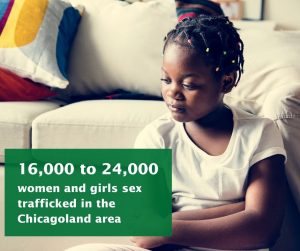A common misconception is that slavery in the United States ended in 1863 when Abraham Lincoln made his Emancipation Proclamation. Legally speaking, it was actually the passage of the 13th Amendment two years later which abolished slavery (except as punishment for a crime). Unfortunately, the truth is slavery continues today all over the world as human trafficking, even here in the U.S.
Human Trafficking Happening in Chicagoland
There are 16,000 to 24,000 women and girls sex trafficked in the Chicagoland area alone. Social, political, and cultural factors can create conditions for human trafficking to thrive, such as disregard for women’s rights or the presence of organized crime. However, a fundamental cause of human trafficking is poverty.
When there is a scarcity of fair-paying jobs and a weak or nonexistent safety net, people live in a perpetually precarious state. A single bad turn of events could result in homelessness or starvation. As a result, people living in poverty become vulnerable to being preyed upon by human traffickers who falsely promise economic stability.
We must address the root of the problem, but you can know the signs to help neighbors today:
Signs someone is being trafficked:
 Fearful of police/authorities
Fearful of police/authorities- Fearful of the trafficker, believing their lives or family members’ lives are at risk if they escape
- Exhibit signs of physical and psychological trauma e.g. anxiety, lack of memory of recent events, bruising, untreated conditions
- Fearful of telling others about their situation
- Be unaware they have been trafficked and believe they are simply in a bad job
- Have limited freedom of movement
- Be unpaid or paid very little
- Have limited access to medical care
- Seem to be in debt to someone
- Have no passport or mention that someone else is holding their passport
- Be regularly moved to avoid detection
- Believe they are being controlled by use of witchcraft
We cannot combat human trafficking if we do not fight poverty.
Our work at CEDA strives to ensure economically vulnerable Chicagoland residents maintain access to necessities such as heat, electricity, and healthy food. Our programs provide a buffer against having to make awful choices in order to survive. Our newest investments in affordable housing, jobs training, and the creation of long-term, sustainable careers will ensure people not only have the means to endure financial hardship, but to thrive by achieving economic self-sufficiency.
Poverty perpetuates a disregard for human rights, as is evidenced by human trafficking. CEDA is committed to upholding people’s dignity through our work of poverty alleviation and economic empowerment. Although the project of eradicating slavery is still not finished, we hope that our contributions will help bring us closer to a world in which all people are truly free.